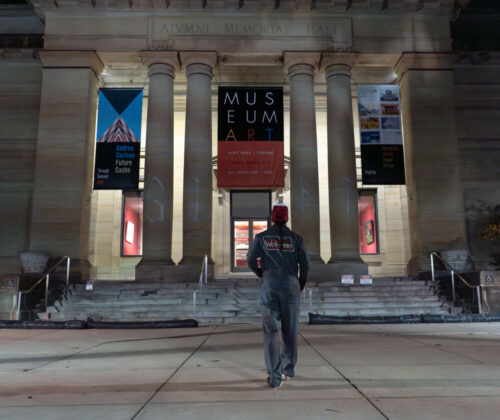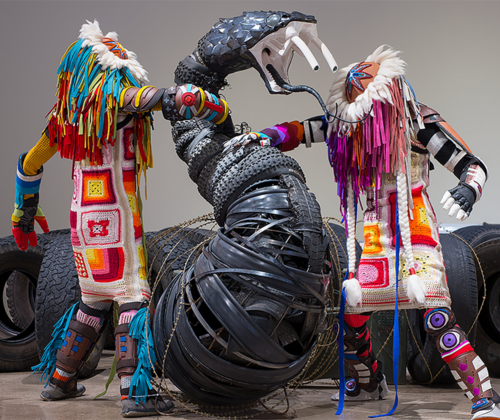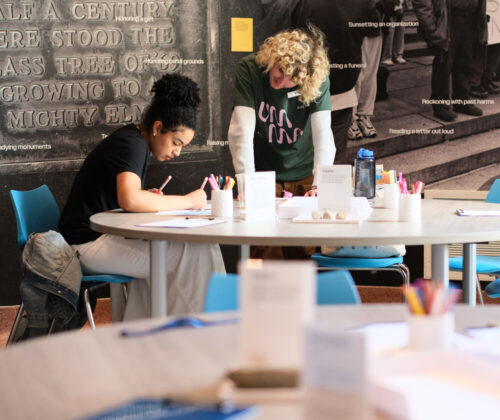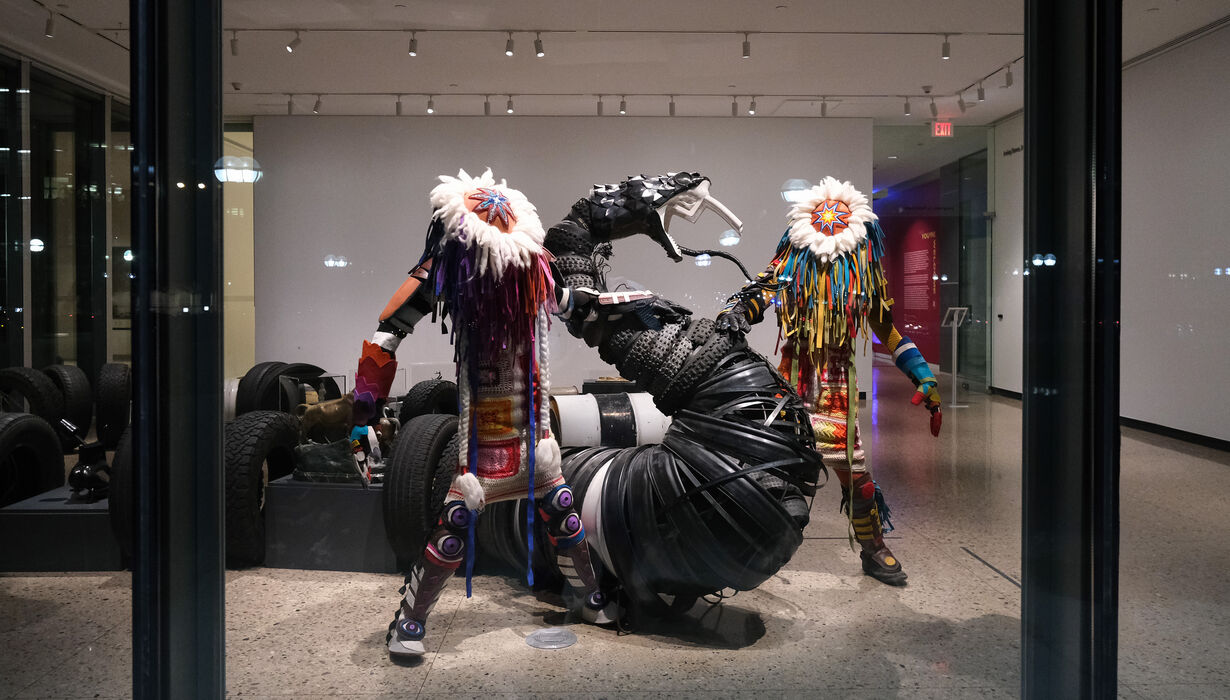Cannupa Hanska Luger: You’re Welcome
How do we Remember?
How do we remember on this campus? This is the central question asked in You’re Welcome, a dynamic three-part exhibition. The result of a multiyear collaboration with artist Cannupa Hanska Luger and nonprofit public art and history studio Monument Lab, You’re Welcome examines the foundational narratives of the land occupied by the University of Michigan and both national and global discourse on nationalism, land sovereignty, militarism, colonialism, and sites of memory.
The exhibition centers on GIFT, an experimental, time-based, commissioned work by Luger on the front facade of UMMA’s Alumni Memorial Hall which challenges institutional memory and the whitewashing of history. GIFT is accompanied by two indoor installations: Meat for the Beast (Irving Stenn, Jr. Family Gallery), which delves into Luger’s artistic practice and the relationship between museum collections and resource extraction; and Monument Lab: Public Classroom (Art Gym), which examines formal and informal modes of memory on the U-M campus and beyond.
You’re Welcome explores the relationship between the Museum’s historic building, the land it stands on, and a long history of colonial narratives deeply embedded in public structures. It supports critical dialogues about the responsibilities of public institutions as cultural history makers and stewards, and it is a key component of UMMA’s ongoing efforts to challenge its history and practices to create an institution more reflective of its community and honest in its explorations of art, culture, and society.
In the Media
About the Exhibition

Exterior Commission
Gift
The centerpiece of the You’re Welcome exhibition, Cannupa Hanska Luger’s GIFT, is an experimental, time-based, commissioned work, responding to and challenging the University of Michigan’s origin story and the stewardship of the land it occupies.
In September 2023, Luger, a multidisciplinary artist and enrolled member of the Three Affiliated Tribes of Fort Berthold (Mandan, Hidatsa, Arikara) and Lakota, painted the word “GIFT” in white porcelain clay slip on the columns of Alumni Memorial Hall, a neoclassical war memorial erected in 1910 that now houses UMMA. His point of departure is the 1817 Treaty of Fort Meigs, in which Ottawa, Chippewa, and Potawatomi tribes “gifted” land to the University that was then sold to found its endowments.
Learn more about GIFT, see photos, and an ongoing timelapse video below.

Gallery Installation
Meat for the Beast
Meat for the Beast comprises two works by the multidisciplinary artist Cannupa Hanska Luger: This is Not a Snake and The One Who Checks and The One Who Balances. An enrolled member of the Three Affiliated Tribes of Fort Berthold (Mandan, Hidatsa, Arikara and Lakota), Luger was born and raised on the Standing Rock Indian Reservation. This is Not a Snake was created there, in the aftermath of the 2016 Dakota Access Pipeline protests. The “snake” is a serpentine monster made of riot gear, ceramics, fiber, steel, oil drums, concertina wire, ammunition cans, trash, beadwork, and other found objects. Interspersed within the creature’s body are artworks from UMMA’s collection selected by Luger and the exhibition’s curators to reflect on the historical and contemporary destruction and extraction of land as an expendable resource.
By positioning the “snake” as if it’s ingesting objects from the museum’s collection, Luger compares the damage done by extractive industries on Indigenous lands to that of museums, which have historically extracted objects and culture from Indigenous communities.

Classroom Space
Monument Lab: Public Classroom
How do we remember on this campus? In addressing this central question of the exhibition You’re Welcome, Monument Lab, a nonprofit public art and history studio, worked with lead artist Cannupa Hanska Luger, University of Michigan Museum of Art staff, and University students, staff, and faculty to gather hundreds of responses. Using 121 of these compiled responses as a starting point, this “classroom” acts as an exploration of memory itself—how we remember, the physical and ephemeral forms memories take, and how they come to constitute the campus itself. This classroom includes a broad range of ways we remember—instances of personal, collective, ancestral, speculative, and institutional approaches to memory.
About the Team

Artist Cannupa Hanska Luger
Multidisciplinary artist Cannupa Hanska Luger is an enrolled member of the Three Affiliated Tribes of Fort Berthold (Mandan, Hidatsa, Arikara), and Lakota. Through monumental installations and social collaborations that reflect a deep engagement and respect for materials, the environment, and community, Luger activates speculative fiction and communicates stories about 21st century Indigeneity. Luger is a 2022 Guggenheim fellow, recipient of the 2021 United States Artists Fellowship Award for Craft, and was named a Grist 50 Fixer for 2021, a list that includes emerging leaders in climate, sustainability, and equity from across the nation.

UMMA Curator Ozi Uduma
UMMA Assistant Curator of Global Contemporary Art Ozi Uduma is a graduate of the University of Michigan Ann Arbor, and double majored in Anthropology and Afroamerican and African Studies. She has worked with UMMA since 2018, first as a curatorial assistant to Laura De Becker, UMMA Helmut and Candis Stern Curator of African Art, and was promoted to assistant curator in 2020. Uduma curated the Unsettling Histories (2021) exhibition and served as curator for UMMA’s presentation of Romare Bearden: Abstraction (2022). She co-curated the Wish You Were Here and We Write To You About Africa projects (2021). With Paul Farber, Uduma is a co-curator of You’re Welcome (2023).

Monument Lab Director Paul Farber
SUPPORT
Lead support for Cannupa Hanska Luger: You’re Welcome project is provided by provided by Teiger Foundation, the U-M Office of the Provost, the U-M Office of the President, Erica Gervais Pappendick and Ted Pappendick, the U-M Marsal Family School of Education, the U-M Institute for the Humanities, Michigan Humanities, and the U-M Arts Initiative. Additional generous support is provided by Melissa Kaish and Jonathan Dorfman.




